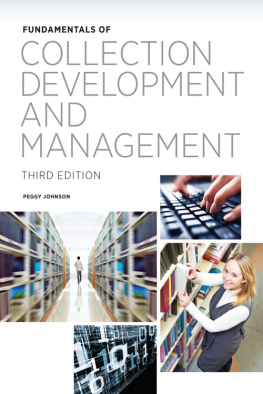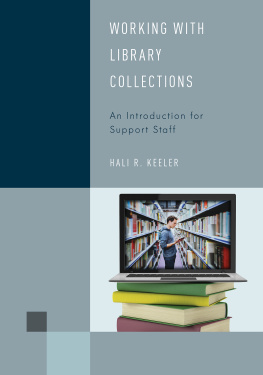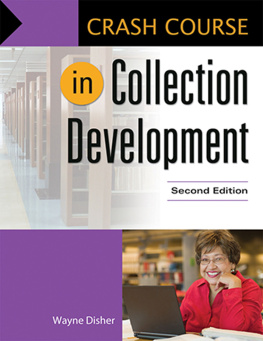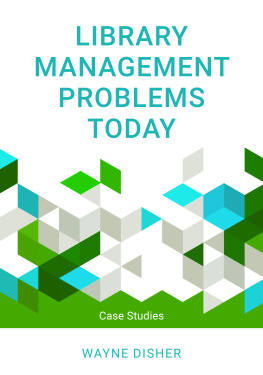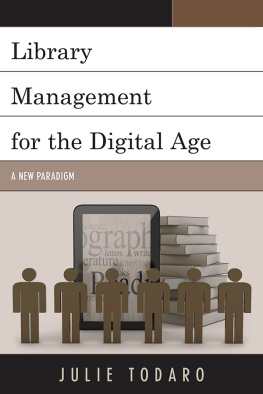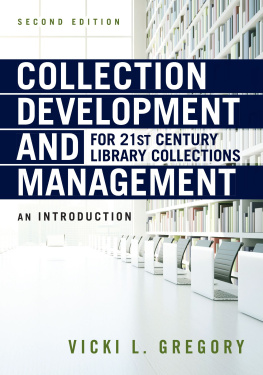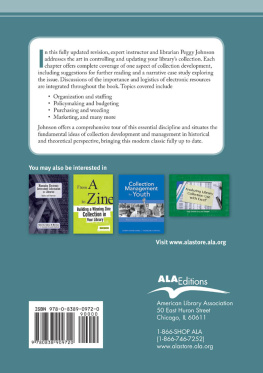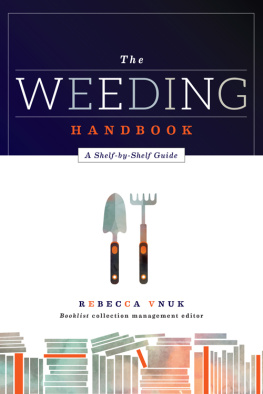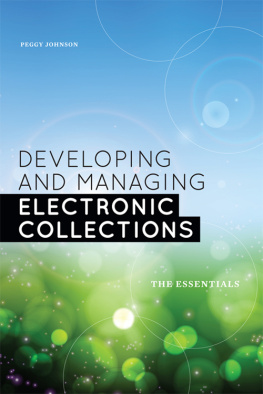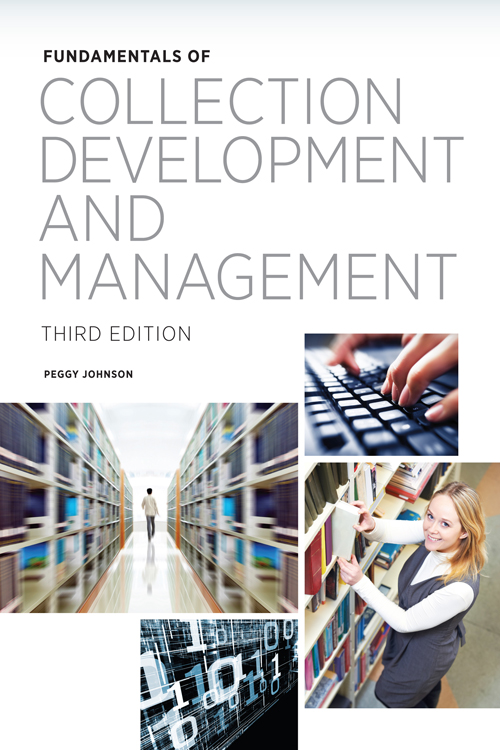
ALA Editions purchases fund advocacy, awareness, and accreditation programs for library professionals worldwide.
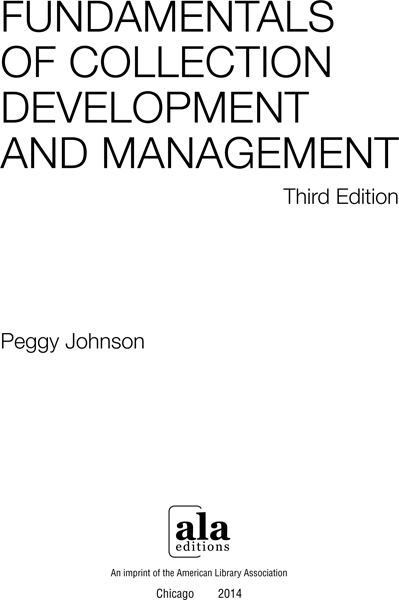
PEGGY JOHNSON is a frequent speaker and trainer on collection development and management. She has published several books, including ALA Editions Developing and Managing Electronic Collections: The Essentials, and numerous journal articles. She edited the peer-reviewed journal Library Resources & Technical Services for more than nine years and continues to edit Technicalities: Information Forum for the Technical Services Professional. She teaches as an adjunct professor in the MLIS program at St. Catherine University. Prior to retiring from the University of Minnesota Libraries, she served as associate university librarian. A past president of the Association for Library Collections and Technical Services, she received the ALCTS Ross Atkinson Lifetime Achievement Award in 2009. She has a masters degree from the University of Chicago Graduate Library School.
Extensive effort has gone into ensuring the reliability of the information in this book; however, the publisher makes no warranty, express or implied, with respect to the material contained herein.
ISBNs: 978-0-8389-1191-4 (paper); 978-0-8389-1959-0 (PDF); 978-0-8389-1960-6 (ePub); 978-0-8389-1961-3 (Kindle). For more information on digital formats, visit the ALA Store at alastore.ala.org and select eEditions.
Library of Congress Cataloging-in-Publication Data
Johnson, Peggy, 1948
[Fundamentals of collection development & management]
Fundamentals of collection development and management / Peggy Johnson. Third edition.
pages cm
Includes bibliographical references and .
ISBN 978-0-8389-1191-4 (alk. paper)
1. Collection development (Libraries) 2. Collection management (Libraries) 3. Collection development (Libraries)United States. 4. Collection management (Libraries)United States. I. Title.
Z687.J64 2014
025.2'1dc23 2013049725
Cover design by Kim Thornton. Images Shutterstock, Inc.
CONTENTS

Supplemental materials, including reading lists and case studies from the first two editions, are available online at www.alaeditions.org/webextras.
My goal in writing this book remains the same as that for the first and second editionsFundamentals of Collection Development and Management is intended as a comprehensive introduction to the topic for students, a primer for experienced librarians with new collection development and management responsibilities, and a handy reference resource for practitioners as they go about their day-to-day work. Coverage is intended to reflect the practice of collection development and management in all types of libraries. Although the focus is on libraries in the United States, references to practices and initiatives in Canada have been expanded. The history of collection development and management is provided to set the context for current theory and practice. I draw from the literature outside library and information management when pertinent.
When I wrote the preface to the first edition in the summer of 2003, I observed that the work of collection development and management was being profoundly changed by the Internet and increasing options for resources in digital format. This is even truer today. Nearly all aspects of collection development and management in all types of libraries are being reshaped by technology and the ubiquity of the Internet. These powerful forces on the work we do and how we do it are made more challenging by sociological, educational, economic, demographic, political, regulatory, and institutional changes in our user communities and the parent organizations and agencies that fund libraries. Library users needs and expectations are evolving concurrently. I have sought to reflect this rapidly changing environment with updated examples and data.
This edition follows the same structure as the second edition. on cooperative collection development and management addresses this increasingly important topic in todays environment of constrained budgets and limited space to house collections.
The final chapter takes on the complicated topic of scholarly communication and the impact of the open-access movement. Although some may not consider the process of reshaping scholarly communication equally pertinent to all types of libraries and the librarians who work in them, I encourage you to read this chapter. The potential that open access offers and the policies that foster it should be of concern to all librarians.
All chapters have new supplemental reading lists, and these contain no sources published before 2008. Reading lists from the first two editions can be accessed as supplemental resources at .
The , Sample Collection Development Policy Statements.
A book, by its nature, is bounded and, although each chapter and many topics addressed here could be and often have been explored in far greater depth, I have been constrained by time and space. The supplemental reading lists are intended to offer readers sources through which they can explore topics of particular interest.
Many sources referenced may be found as preprints or postprints in digital repositories, as well as in the journals cited. All URLs provided in this book were valid as of late fall 2013. References to products, companies, projects, and initiatives are intended as examples only and not endorsements of particular options among many possibilities. Commercial offerings, business models, and companies change; thus, some information in this book may not reflect the current environment.
I depend on the expertise of professional colleagues and their generous assistance whenever I undertake a writing project. They may answer a single question or several, point me to a key resource, or review a few paragraphs or a chapter. As I revised this book, I tried to note everyone who helped me and I am delighted to thank them here; all errors and omissions in the text are solely my responsibility. In grateful appreciation, I thank (in alphabetical order): Natalie Bernstein, Paideia School, Atlanta, Georgia; Julia Blixrud, Association of Research Libraries; Elise Calvi, Indiana University Libraries; Katie Clark, University of Rochester River Campus Libraries; Kirsten Clark, University of Minnesota Libraries; Lynn Silipigni Connaway, OCLC; Lisa German, Pennsylvania State University Libraries; Heidi Hammond, St. Catherine University Masters of Library and Information Science program; Michelle Jeske, Denver Public Library; Brian Karschnia, St. Paul Public Library; Robert H. Kieft, Occidental College; Michael Levine-Clark, University of Denver Libraries; Judy Luther, Informed Strategies; Bonnie MacEwan, Auburn University Libraries; Eric Novotny, Pennsylvania State University Libraries; Jan Price, Metropolitan Council Library, St. Paul, Minnesota; Becky Ringwelski, Minitex, Minnesota; Nancy Sims, University of Minnesota Libraries; Betsy Simpson, University of Florida Libraries; Sarah Simpson, Tulsa City-County Library; Peter Suber, Harvard University Berkman Center for Internet and Society and Harvard University Library Office for Scholarly Communication; Barry Trott, Williamsburg Regional Library, Williamsburg, Virginia; Liza Weisbrod, Auburn University Libraries; and Karen Williams, University of Arizona Libraries.
Next page
